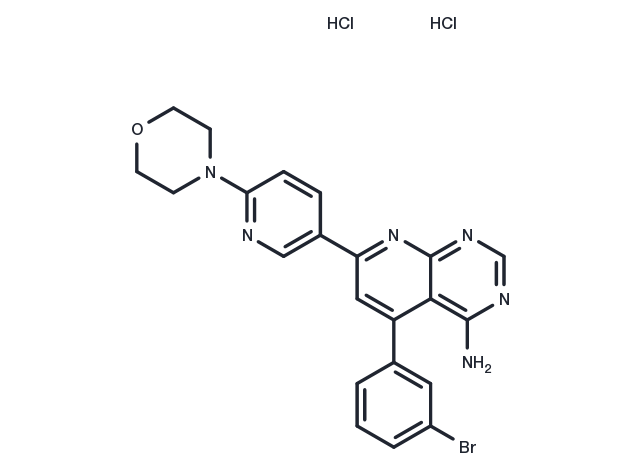Powder: -20°C for 3 years | In solvent: -80°C for 1 year
ABT-702 dihydrochloride 是腺苷激酶抑制剂,IC50为1.7 nM。

| 规格 | 价格/CNY | 货期 | 数量 | |
|---|---|---|---|---|
| 1 mg | ¥ 473 | 现货 | ||
| 2 mg | ¥ 738 | 现货 | ||
| 5 mg | ¥ 1,280 | 现货 | ||
| 10 mg | ¥ 1,980 | 现货 | ||
| 25 mg | ¥ 3,490 | 现货 | ||
| 50 mg | ¥ 4,970 | 现货 | ||
| 100 mg | ¥ 7,220 | 现货 | ||
| 500 mg | ¥ 14,300 | 现货 | ||
| 1 mL * 10 mM (in DMSO) | ¥ 1,670 | 现货 | ||
| 产品描述 | ABT-702 dihydrochloride is a potent adenosine kinase (AK) inhibitor. |
| 靶点活性 | Adenosine kinase:1.7nM |
| 体外活性 | ABT-702 is an orally effective adenosine kinase inhibitor that has several orders of magnitude selectivity over other sites of adenosine (ADO) interaction (A1, A2A, A3 receptors, ADO transporter, and ADO deaminase). ABT-702 is equipotent (IC50=1.5±0.3 nM) in inhibiting native human AK (placenta), two human recombinant isoforms (AKlong and AKshort), and AK from monkey, dog, rat, and mouse brain.ABT-702 also potently inhibits AK activity in intact cultured IMR-32 human neuroblastoma cells (IC50=51 nM), indicating that ABT-702 can penetrate the cell membrane and potently inhibit AK at its intracellular site. |
| 体内活性 | Rats are given an intraperitoneal injection of the adenosine A1 receptor antagonist DPCPX (3 mg/kg), ABT-702 (3 mg/kg), or vehicle 10 minutes prior to an intravenous injection of 2-18F-fluorodeoxy-D-glucose (FDG) (FDG, 15.4±0.7 MBq per rat). Rats are then subjected to a 15 minute static positron emission tomography (PET) scan. Reconstructed images are normalized to FDG PET template for rats and standard uptake values (SUVs) are calculated. To examine the regional effect of active treatment compared to vehicle, statistical parametric mapping analysis is performed. Whole-brain FDG uptake is not affected by drug treatment. Significant regional hypometabolism is detected, particularly in cerebellum, of DPCPX and ABT-702 treated rats, relative to vehicle-treated rats. Thus, endogenous adenosine can affect FDG accumulation although this effect is modest in quiescent rats. Body weight (316.8±28.4 g; mean±SD) and blood glucose (5.5±1.7 mM) are not significantly different among three groups. Whole-brain PET SUV values are 1.6±0.4, 1.6±0.6, and 1.8±0.6 for vehicle, ABT-702, and DPCPX-treated rats, respectively (F(2,9)=0.298, P=0.75). statistical parametric mapping (SPM) analysis reveals significant regional hypometabolism in the cerebellum, mesenceph.ABT-702 significantly reduces acute thermal nociception in a dose-dependent manner after both intraperitoneal (ED50=8 μmol/kg i.p.) and oral (ED50=65 μmol/kg p.o.) administration in the mouse hot-plate test. Consistent with its antinociceptive effects in the hot-plate assay, ABT-702 also produces dose-dependent antinociceptive effects (ED50=2 μmol/kg i.p.) in the abdominal constriction assay. |
| 动物实验 | Rats are fasted for 16 hours prior to use. At the beginning of the experiment, each rat is weighed, and then anesthetized using 5% isoflurane for induction and 2.5% for maintenance. A blood sample from tail vein is collected for a fasting blood glucose determination using a standard glucometer. Rats are then given an intraperitoneal (i.p.) injection of DPCPX (3 mg/kg, n=4), ABT-702 (3 mg/kg, n=4), or an equivalent volume of vehicle (15% dimethyl sulfoxide, 15% cremophor EL, 70% saline, n=4) to manipulate the effect of endogenous adenosine on neuronal activities. Ten minutes after i.p. injection, rats are administered FDG (15.4±0.7 MBq) in 0.3-0.5 mL saline by intravenous (i.v.) tail vein injection. Rats are allowed to recover from anesthesia after the FDG injection but are reanesthetized for 15-minute-static PET scan with the head in the center of the field of view. |
| 分子量 | 536.25 |
| 分子式 | C22H21BrCl2N6O |
| CAS No. | 1188890-28-9 |
Powder: -20°C for 3 years | In solvent: -80°C for 1 year
DMSO: 45 mg/mL (83.91 mM)
| 可选溶剂 | 浓度 体积 质量 | 1 mg | 5 mg | 10 mg | 25 mg |
| DMSO | 1 mM | 1.8648 mL | 9.324 mL | 18.648 mL | 46.62 mL |
| 5 mM | 0.373 mL | 1.8648 mL | 3.7296 mL | 9.324 mL | |
| 10 mM | 0.1865 mL | 0.9324 mL | 1.8648 mL | 4.662 mL | |
| 20 mM | 0.0932 mL | 0.4662 mL | 0.9324 mL | 2.331 mL | |
| 50 mM | 0.0373 mL | 0.1865 mL | 0.373 mL | 0.9324 mL |
对于不同动物的给药剂量换算,您也可以参考 更多...
请在以下方框中输入您的动物实验信息后点击计算,可以得到母液配置方法和体内配方的制备方法: 比如您的给药剂量是10 mg/kg,每只动物体重20 g,给药体积100 μL,一共给药动物10 只,您使用的配方为5% DMSO+30% PEG300+5% Tween 80+60% ddH2O。那么您的工作液浓度为2 mg/mL。
母液配置方法:2 mg 药物溶于 50 μL DMSO (母液浓度为 40 mg/mL), 如您需要配置的浓度超过该产品的溶解度,请先与我们联系。
体内配方的制备方法:取 50 μL DMSO 主液,加入 300 μL PEG300, 混匀澄清,再加 50 μL Tween 80,混匀澄清,再加 600 μL ddH2O, 混匀澄清。
您可能有的问题的答案可以在抑制剂处理说明中找到,包括如何准备库存溶液,如何存储产品,以及基于细胞的分析和动物实验需要特别注意的问题。
ABT-702 dihydrochloride 1188890-28-9 GPCR/G Protein Neuroscience Adenosine Receptor ABT702 dihydrochloride ADK ABT 702 Dihydrochloride Inhibitor inhibit ABT-702 Adenosine Kinase ABT 702 ABT 702 dihydrochloride ABT-702 Dihydrochloride ABT702 ABT702 Dihydrochloride inhibitor
